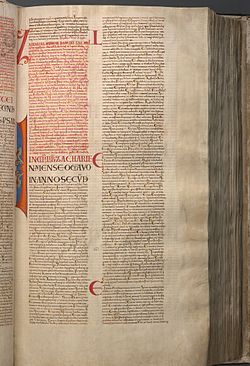The Book of Haggai is a book of the Hebrew Bible or Tanakh, and is the third-to-last of the Twelve Minor Prophets. It is a short book, consisting of only two chapters. The historical setting dates around 520 BC, before the Temple had been rebuilt. The original text was written in Biblical Hebrew.
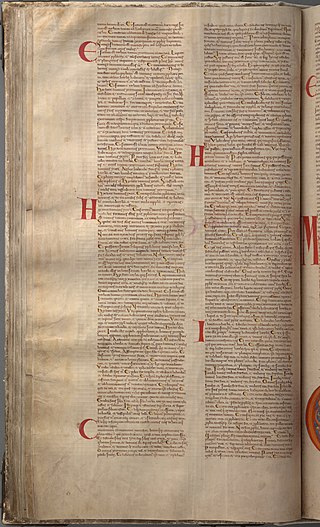
Zechariah 12 is the twelfth of the 14 chapters in the Book of Zechariah in the Hebrew Bible and the Old Testament of the Christian Bible. This book contains the prophecies attributed to the prophet Zechariah, and is a part of the Book of the Twelve Minor Prophets. This chapter is a part of a section consisting of Zechariah 9–14. This chapter and chapter 13 verses 1–6 are a section, forming a three-section "entity" with 13:7–9 and 14:1-21.
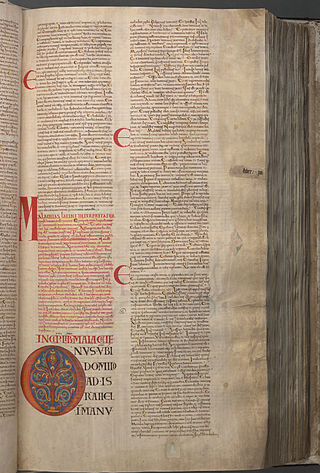
Zechariah 14 is the fourteenth chapter in the Book of Zechariah in the Hebrew Bible and the Old Testament of the Christian Bible. This book contains the prophecies attributed to the prophet Zechariah, and is a part of the Book of the Twelve Minor Prophets. This chapter is a part of a section consisting of Zechariah 9–14. It continues the theme of chapters 12 and 13 about the 'war preceding peace for Jerusalem in the eschatological future'. It is written almost entirely in third-person prophetic discourse, with seven times references to the phrase 'that day'.

Zechariah 4 is the fourth of the 14 chapters in the Book of Zechariah in the Hebrew Bible or the Old Testament of the Christian Bible. This book contains the prophecies attributed to the prophet Zechariah, and is a part of the Book of the Twelve Minor Prophets. This chapter is a part of a section consisting of Zechariah 1–8.

Zechariah 3 is the third of the 14 chapters in the Book of Zechariah in the Hebrew Bible or the Old Testament of the Christian Bible. This book contains the prophecies attributed to the prophet Zechariah, and is a part of the Book of the Twelve Minor Prophets. The chapter contains the vision of Joshua, the high priest, being cleansed before God. It is a part of a section consisting of Zechariah 1–8.
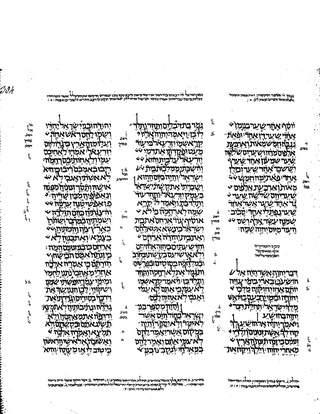
Zechariah 2 is the second of the 14 chapters in the Book of Zechariah in the Hebrew Bible or the Old Testament of the Christian Bible. This book contains the prophecies attributed to the prophet Zechariah, and is a part of the Book of the Twelve Minor Prophets. This chapter is a part of a section consisting of Zechariah 1–8. It records the third of eight visions received by the prophet, followed by an oracle calling the exiles to return to the city where Yahweh is about to dwell and all nations will come.

Zechariah 5 is the fifth of the 14 chapters in the Book of Zechariah in the Hebrew Bible or the Old Testament of the Christian Bible. This book contains the prophecies attributed to the prophet Zechariah, and is a part of the Book of the Twelve Minor Prophets. This chapter records the sixth and seventh of the eight visions of Zechariah which are compiled in a section consisting of Zechariah 1–8.

Zechariah 6 is the sixth of the 14 chapters in the Book of Zechariah in the Hebrew Bible or the Old Testament of the Christian Bible. This book contains the prophecies attributed to the prophet Zechariah, and is a part of the Book of the Twelve Minor Prophets. This chapter contains the description of the eighth vision and the crowning of Joshua. It is a part of a section consisting of Zechariah 1–8.

Zechariah 7 is the seventh of the 14 chapters in the Book of Zechariah in the Hebrew Bible or the Old Testament of the Christian Bible. This book contains the prophecies attributed to the prophet Zechariah, and is a part of the Book of the Twelve Minor Prophets. This chapter is a part of a section consisting of Zechariah 1–8. The Jews having sent to inquire concerning the set fasts, Zechariah 7:1-3, Zechariah reproves the hypocrisy of their fasts, Zechariah 7:4-7, and they are exhorted by repentance to remove the cause of their calamity, Zechariah 7:8-14.
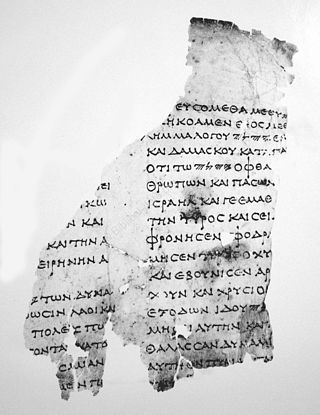
Zechariah 8 is the eighth of the 14 chapters in the Book of Zechariah in the Hebrew Bible or the Old Testament of the Christian Bible. This book contains the prophecies attributed to the prophet Zechariah, and is a part of the Book of the Twelve Minor Prophets. This chapter is a part of a section consisting of Zechariah 1–8. This chapter contains a continuation of the subject in the seventh chapter.
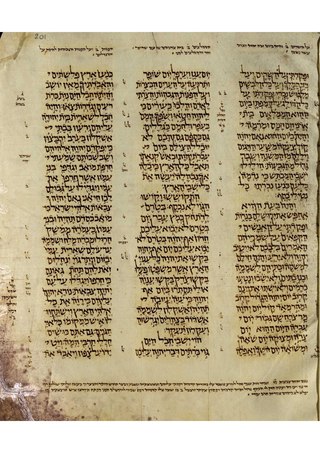
Zechariah 9 is the ninth of the 14 chapters in the Book of Zechariah in the Hebrew Bible or the Old Testament of the Christian Bible. This book contains the prophecies attributed to the prophet Zechariah, and is a part of the Book of the Twelve Minor Prophets. This chapter is a part of a section consisting of Zechariah 9–14. It concerns the advance of an enemy, but God defends Jerusalem and his king will triumphantly enter the city to bring peace among all nations. This chapter also contains a continuation of the subject in the seventh chapter. The part about the king's entry into Jerusalem is quoted in the New Testament, especially in the event of Jesus' triumphal entry into Jerusalem.

Zechariah 10 is the tenth of the 14 chapters in the Book of Zechariah in the Hebrew Bible or the Old Testament of the Christian Bible. This book contains the prophecies attributed to the prophet Zechariah, and is a part of the Book of the Twelve Minor Prophets. This chapter is a part of a section consisting of Zechariah 9–14.

Zechariah 11 is the eleventh of the 14 chapters in the Book of Zechariah in the Hebrew Bible or the Old Testament of the Christian Bible. This book contains the prophecies attributed to the prophet Zechariah, and is a part of the Book of the Twelve Minor Prophets. This chapter is a part of a section consisting of Zechariah 9–14.

Jeremiah 29 is the twenty-ninth chapter of the Book of Jeremiah in the Hebrew Bible or the Old Testament of the Christian Bible. It is numbered as Jeremiah 36 in the Septuagint. This book compiles prophecies attributed to the prophet Jeremiah, and is one of the Books of the Prophets. This chapter records several "letters reported by the third-person narrator": from Jerusalem, Jeremiah sent a letter to the people in the Babylonia exile and he responded to a letter about him from Shemaiah.

Jeremiah 33 is the thirty-third chapter of the Book of Jeremiah in the Hebrew Bible or the Old Testament of the Christian Bible. It is numbered as Jeremiah 40 in the Septuagint. This book contains prophecies attributed to the prophet Jeremiah, and is one of the Books of the Prophets.

Jeremiah 25 is the twenty-fifth chapter of the Book of Jeremiah in the Hebrew Bible or the Old Testament of the Christian Bible. This book contains prophecies attributed to the prophet Jeremiah, and is one of the Books of the Prophets. Chapter 25 is the final chapter in the first section of the Book of Jeremiah, which deals with the earliest and main core of Jeremiah's message. In this chapter, Jeremiah identified the length of the time of exile as seventy years.

Jeremiah 50 is the fiftieth chapter of the Book of Jeremiah in the Hebrew Bible or the Old Testament of the Christian Bible. This book contains prophecies attributed to the prophet Jeremiah, and is one of the Books of the Prophets. This chapter is part of a series of "oracles against foreign nations", consisting of chapters 46 to 51. Chapters 50 and 51 focus on Babylon. The New American Bible denotes chapter 50 as "the first oracle against Babylon" and chapter 51 as "the second oracle". An unnamed "enemy from the North" is predicted to reduce imperial Babylon "to a wasteland".

Ezra 5 is the fifth chapter of the Book of Ezra in the Old Testament of the Christian Bible, or the book of Ezra–Nehemiah in the Hebrew Bible, which treats the book of Ezra and book of Nehemiah as one book. Jewish tradition states that Ezra is the author of Ezra–Nehemiah as well as the Book of Chronicles, modern scholars generally claim that a compiler from the 5th century BCE is the final author of these books. The section comprising chapter 1 to 6 describes the history before the arrival of Ezra to the land of Judah in 468 BCE. This chapter records the contribution of the prophets Haggai and Zechariah to the temple building project and the investigation by Persian officials.

Ezra 6 is the sixth chapter of the Book of Ezra in the Old Testament of the Christian Bible, or the book of Ezra–Nehemiah in the Hebrew Bible, which treats the book of Ezra and book of Nehemiah as one book. Jewish tradition states that Ezra is the author of Ezra–Nehemiah as well as the Book of Chronicles, but modern scholars generally accept that a compiler from the 5th century BCE is the final author of these books. The section comprising chapter 1 to 6 describes the history before the arrival of Ezra in the land of Judah in 468 BCE. This chapter records the response of the Persian court to the report from Tattenai in the previous chapter: a search is made for the original decree by Cyrus the Great and this is confirmed with a new decree from Darius the Great allowing the temple to be built. This chapter closes this first part of the book in a "glorious conclusion with the completion of the new temple and the celebration of Passover" by the people, as their worship life is restored according to the Law of Moses.
